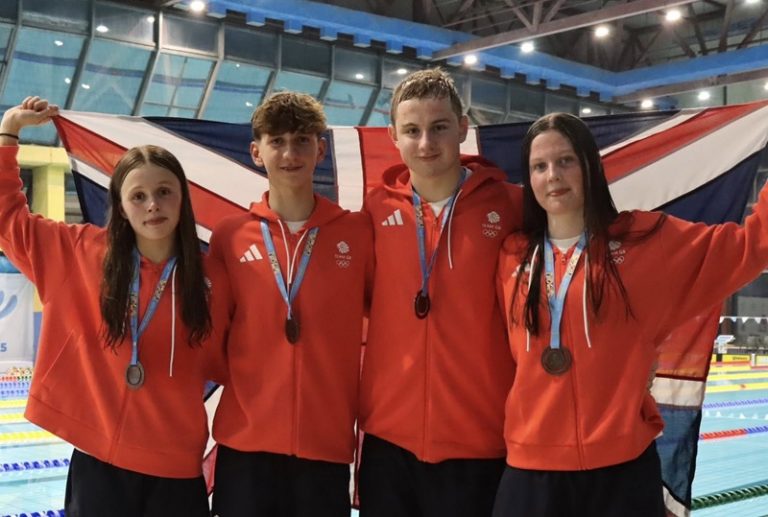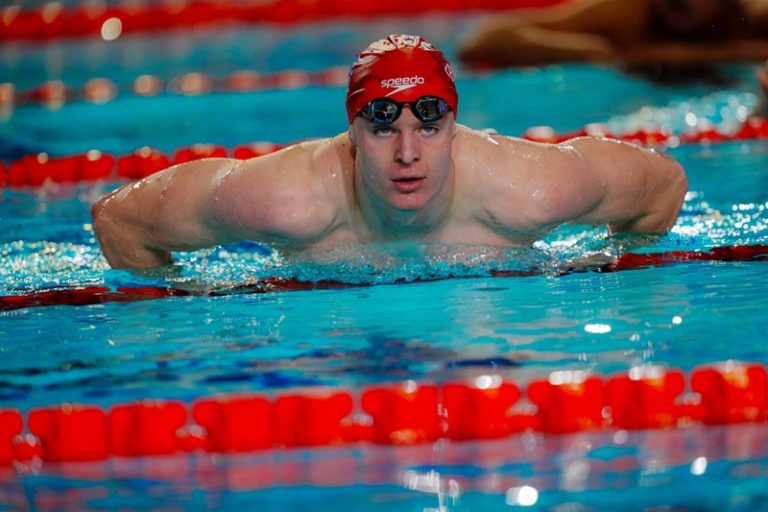From 1 to 6 July 2025, Europe’s brightest young swimming talents gathered in Šamorín, Slovakia, for the European Junior Championships. Staying true to their long-standing tradition of excellence in youth categories, the British delegation delivered an exceptional performance, topping the medal table with 19 medals, including 9 golds. Seven of those titles came in individual events, won by five different swimmers, underlining the impressive depth of British talent. Two athletes even managed the remarkable feat of winning two individual golds. Here’s a look back at a memorable week for the United Kingdom’s team.

Filip Nowacki: The meteoric rise of the breaststroke prince
At just 17 years old, Filip Nowacki has established himself as Europe’s standout junior breaststroker. A silver medallist in the 200m breaststroke in 2024, the British swimmer turned potential into gold in 2025, leaving Slovakia with five medals, including four golds and a place in the record books thanks to a series of outstanding performances.
His golden campaign began in the 200m breaststroke, where he set the tone by smashing the European junior record in the semi-finals with a time of 2:09.11, bettering the previous mark of 2:09.64, as well as the championship and British age-group records. In the final, he cemented his dominance with a perfectly-paced race, maintaining consistent splits between 32.64 and 33.75 across the four lengths, leaving his rivals trailing.
But that was just the beginning. In the 100m breaststroke, Nowacki continued his sensational form, clocking an astonishing 59.59 – making him the third-fastest 17-year-old in history, behind Japanese pair Shin Ohashi and Akihiro Yamaguchi, and the fourth-fastest British man ever in the event, trailing only the legendary Adam Peaty. Over the week, he progressively broke the British 17-year-old record from 1:00.10 (formerly held by Max Morgan) down to 59.96, 59.92… and finally a staggering 59.59 in the final.
He also impressed in the sprint breaststroke. Kicking off his campaign with the 50m breaststroke, Nowacki lowered the British age-group record twice in two days, eventually clocking 27.61 in the final to take silver behind Turkey’s Nusrat Allahverdi (27.24). The result brings him within touching distance of Adam Peaty’s British 18-year-old record (27.58) and confirms his incredible explosiveness.
Nowacki also played a crucial role in the mixed 4x100m medley relay, helping Britain set a new European junior record with a blistering 59.25 breaststroke split – the fastest ever recorded in a junior mixed relay.
Originally developed at Jersey Tigers Swimming Club under Nathan Jegou, Nowacki now trains at Millfield under coach Kieron Piper – the same programme that produced British star Matt Richards. With such consistent and spectacular progress, he’s already a strong contender for senior international selection and looks every bit a worthy heir to Adam Peaty.
Amalie Smith: The individual medley sensation
Just 15 years old, Amalie Smith lit up the 2025 European Juniors with a commanding double in the 200m and 400m individual medley. Not only did she claim two continental titles, but she also broke multiple historic records along the way – most notably the European junior record in the 400m IM with a phenomenal 4:37.02. That time places her sixth all-time among British women and ahead of established senior stars like Katie Shanahan.
Her gold wasn’t a foregone conclusion. Facing two-time defending champion Vivien Jackl of Hungary, Smith crafted a tactically brilliant race. Four seconds adrift after the backstroke leg, she produced a storming breaststroke (1:17.09 to Jackl’s 1:22.75) to seize control, before finishing strong in freestyle. Her final time obliterated the previous championship record (4:39.28) and took more than four seconds off her personal best.
A few days later, Smith completed her double in the 200m IM, outduelling Germany’s Noelle Benkler in a thrilling final. Her time of 2:12.62 broke the long-standing British age-15 record held by Siobhan-Marie O’Connor since 2011 – a mark set by the future Olympic silver medallist in Rio. O’Connor’s final 50m split was 32.22; Smith blasted home in 30.83. Already having clocked 2:13.15 in the semis, Smith found another gear when it mattered, winning by just over a tenth and firmly establishing herself as one of Britain’s most exciting prospects in an event currently dominated globally by young Britons like Shanahan and Freya Colbert.
Dean Fearn: A British rocket in the butterfly
By winning the 50m butterfly in 23.29, Dean Fearn not only secured another gold for the British team, but also delivered a statement swim in junior European history. He took down the championship record previously held by Teo del Riego, and set a new British age-group best, becoming the fourth-fastest British ever in the event – ahead of Adam Barrett and just three-tenths shy of national record-holder Ben Proud.
What made the feat even more remarkable was the demanding schedule Fearn faced. Just an hour before his 50m fly final, he placed fifth in the 100m backstroke final with a strong 55.12, narrowly off his PB (54.82). He went on later that evening to anchor the 4x100m medley relay alongside Nowacki, Jack Brown and Gabriel Shepherd – clinching another gold in style.
Earlier in the meet, Fearn had played a key role in the mixed 4x100m medley relay, producing a 52.44 butterfly leg. He also took silver in the individual 100m butterfly with a new PB of 52.64, edged out only by Lithuania’s Tajus Juska. Over the week, Fearn slashed more than eight-tenths off his 100 fly best and four-tenths off his 50m time, marking him out as a genuine successor to Ben Proud.
Blythe Kinsman: The British backstroke queen
While Britain’s butterfly and medley swimmers stole much of the spotlight in Šamorín, Blythe Kinsman dominated the backstroke events, living up to her billing as the country’s top junior in the discipline. The 18-year-old won two European medals, including a superb gold in the 50m backstroke with a PB of 27.79 – the seventh-fastest time ever by a British woman. The only swimmer under 28 seconds in the final, she nearly broke the championship record (27.74), leaving Denmark’s Martine Damborg (28.18) and Romania’s Daria-Mariuca Silisteanu (28.26) in her wake.
Kinsman added bronze in the 100m back, finishing in 1:00.70 in a tightly-fought final where three swimmers were separated by just three-tenths. Silisteanu (1:00.40) and France’s Jeanne Lechevalier (1:00.52) took gold and silver respectively, but Kinsman held firm for a podium finish in a race where no one broke the 60-second barrier. Consistent and composed across both distances, she’s quickly becoming one of Europe’s most promising backstrokers – with potential to break through on the senior stage, particularly in a British women’s backstroke scene still chasing global medals.
Dominant relays and breakthrough podiums boost medal tally
Alongside the individual brilliance, Britain’s strength in depth shone through in the relays, where the team secured four medals – including two emphatic golds. The men’s 4x100m medley relay (Fearn, Nowacki, Brown, Shepherd, with Ransom, Inglis and Milne swimming in heats) dominated the final in 3:38.09. The mixed 4x100m medley relay – Kinsman, Nowacki, Fearn and Theodora Taylor – claimed gold with a new championship record of 3:47.07.
There was also silver in the mixed 4x100m freestyle (Milne, Shepherd, Carter, Taylor) and bronze in the men’s equivalent (Shepherd, Brown, Milne, Daodu), showcasing the team’s relay firepower.
On the distance side, Amelie Blocksidge confirmed her class with a dominant win in the 1500m freestyle (16:10.23) and added bronze in the 800m (8:33.78). Theodora Taylor, a key contributor in relays, also impressed individually with silver in the 50m freestyle (25.12) and bronze in the 100m breaststroke (1:08.47). Edith Price added silver in the 200m butterfly (2:10.42), and Amalie Smith, not content with her IM titles, helped the girls’ 4x200m freestyle squad (Cooper, Compton, Wilson) to bronze.
With a remarkable total of 26 medals – including nine golds – The United Kingdom dominated the championships and laid down a marker ahead of future global competitions. Looking ahead to the Los Angeles 2028 Olympics, many of these young swimmers could well be ready to make the leap to the world stage and form the backbone of British swimming’s next golden generation.



